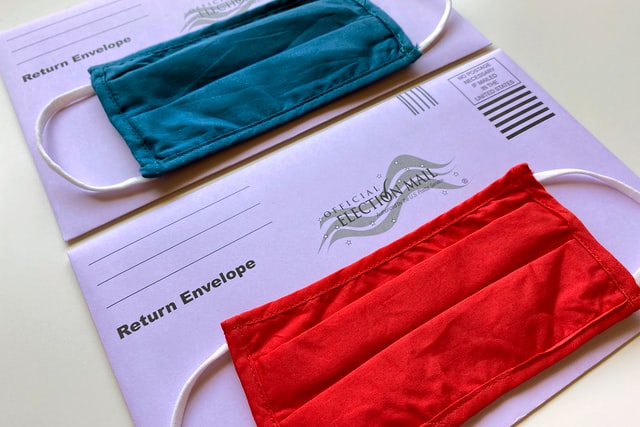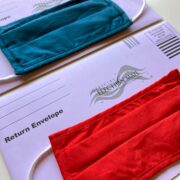
by Philip Lim Nulud and Mari Bandoma Callado
Former President Dwight Eisenhower once said, “[t]he future of this republic is in the hands of the American voter.”
This is especially poignant as we approach the 2020 General Election in November. While the focus of the election is on who will be president, there is much more at stake—social equality, climate change, healthcare, taxes, and foreign policy, to name just a few. Over the past few months, our nation has faced an ongoing global pandemic, an economic downturn, record-high unemployment rates, and civic unrest from years of engrained social inequity.
According to the Pew Research Center, only 61% of voting-age citizens turned out to vote during the last presidential election in 2016. As Thomas Jefferson so aptly said, “[w]e do not have government by the majority. We have government by the majority who participate.” Whether it be due to apathy or inconvenience, we as citizens cannot stand idly by and we must exercise our civic duty to vote.
Voting is an important responsibility we all share in our democratic society. This election, we have an incredible opportunity to shape the future of our community. It is vital that candidates and elected officials understand the growing political power of Asian Americans and Pacific Islanders and address issues that affect our communities. Asian Americans and Pacific Islanders are the fastest-growing racial group in the country.
In 2018, a survey by APIA Vote and AAPI Data indicated that the number of Asian American voters in the last decade has nearly doubled from about 2 million voters in 2000 to 5 million voters in 2016, and that Filipino American voters make up the second-largest group that account for this figure. This year, more than 11 million Asian Americans will be eligible to vote, making up nearly 5% of the nation’s eligible voters per the Pew Research Center’s analysis of Census Bureau data.
The COVID-19 pandemic presents potential barriers to community members to vote in-person. Long and crowded lines at polling places will force citizens to choose between risking COVID-19 exposure and their right to vote. While many, if not all, in-person polling places will take certain safeguards with regard to social distancing and masks, voting by mail is a viable option for many.
To help ensure the exercise of the right to vote while balancing the health and safety of voters and poll workers alike, many states have expanded mail-in voting.
For example, California is automatically sending mail-in ballots out to all registered voters (many should have received their ballots by now), and Colorado, Hawaii, Oregon, Utah, and Washington are holding their elections entirely by mail. Moreover, voters in 28 states and the District of Columbia have the right to request a mail ballot without excuse this coming election. (Please check your particular state’s rules as each state handles mail-in voting, as well as their respective timeframes, slightly differently.)
Voting by mail is not a new concept. Much of the country has voted by mail through an absentee ballot for years. In fact, absentee voting by mail first started during the 1860s to allow members of the military to vote during the Civil War. According to the U.S. Election Assistance Commission, an independent U.S. government agency, 24% of the ballots cast in the 2016 election were through mail-in absentee voting.
Many of us, including the authors of this op-ed, have used absentee ballots to vote by mail for years because of the sheer convenience. It affords one with the ability to take their time while reviewing the various options on the ballot. It provides the ability to maintain one’s regular daily routine and not have to go out of their way to go to a polling location (especially if they’re far away). And, it allows one to just avoid crowds in general. What a year to avoid crowds! (If you’re wondering, you also get an “I Voted” sticker when you vote by mail, so you’ll still be able to show off on the ‘gram that you voted.)
With all these benefits to mail-in voting, including the ability to avoid COVID-19 health risks with large crowds at polling places this year, there are still many that are reluctant to vote by mail. Why? The arguments range from the opportunity for fraud or potential error from mail-in voting, as well as ballots not being handled or delivered properly by the U.S. Postal Service due to budget cuts. Additionally, some believe that voting by mail favors one party over another. While these are all potentially valid concerns, they are unfounded.
With regard to fraud and error, that is a misconception, paranoia, and exaggeration. There are several anti-fraud protections built into the process. In order to vote, one must be registered to vote. Ballots are only provided to registered voters and they are specifically tied to such registration, which are also cross-checked through other databases, such as the DMV’s database. States are taking safeguards to verify voters’ information so that ballots are only issued to rightful voters and that a vote only counts once. Additionally, election officials can track ballots throughout the process using a barcode. In most states, rather than mailing their ballot through the USPS, voters also have the option of dropping off their ballot at a secure government office, a secure official ballot drop box, or other identified locations.
The Federal Bureau of Investigation has also weighed in. In an August 26, 2020 briefing to the press regarding election security, FBI officials stated that they have found no evidence of coordinated fraud with mail-in ballots and they even went as far as to highlight how unlikely such a scenario would be. Those who abuse mail ballots can be charged with election fraud and face stiff fines and/or prison time.
Even though the USPS was subject to budget cuts, prompting questions on its ability to timely deliver mail-in ballots, that should no longer be an issue due to court orders. Courts across the nation have issued injunctions ordering that election mail must be prioritized. For example, the U.S. District Court for the Southern District of New York, in Mondaire Jones, et. al. v. United States Postal Service, et. al., ruled that the USPS shall treat all election mail as first-class mail or priority mail express, pre-approve overtime that has been or will be requested for the time period beginning October 26 – November 6, and restore the on-time delivery of mail. Other courts across the nation have taken similar actions. As an additional safeguard, some states, like California, have implemented a process where a voter can track the status of their ballot online.
Voting by mail does not favor any particular party. Mail-in voting simply allows more people to vote, and does not favor any candidate or party. In a recently released research article by the Proceedings of the National Academy of Sciences of the United States of America, independent researchers found that “universal vote-by-mail does not affect either party’s share of turnout or either party’s vote share”. Thus, no matter what your political affiliation, the ability to vote by mail (or in-person) does not change the balance towards any direction.
Mail-in voting is at the forefront this year but it does not mean that the act of voting is any different, nor is its need any less. 2020 has brought about significant change in our daily lives, but it has not taken away our right to let our voices be heard. Our vote is even more important now than ever. Make sure you exercise your right to vote, whether by mail, or in person. As said in Hamilton, “do NOT throw away your shot.”
If you have any other questions regarding voting, the National Filipino American Lawyers Association has created a Voter Protection Program (VoPro). The NFALA VoPro is a national non-partisan effort designed to protect the vote and rights of voters for the upcoming election. Fil-Am attorneys from across the nation will be available to answer questions regarding voting in California, Arizona, and Nevada. For more information on the program, please visit www.nfala.com/VoPro.
* * *
Philip Lim Nulud is an attorney at Buchalter in Los Angeles, where he specializes in intellectual property law. Many of his clients are well-known fashion brands, who he represents in IP protection, strategy, enforcement, and licensing matters worldwide. He is the current president of the National Filipino American Lawyers Association (NFALA) and a past president of the Philippine American Bar Association (PABA). He has been named as one of the Most Influential Minority Attorneys in Los Angeles by the Los Angeles Business Journal.
* * *
Mari Bandoma Callado is an attorney at the Dolan Law Firm in Oakland, where she represents employees in wrongful termination, discrimination, harassment, retaliation, whistleblower and human trafficking cases as well as injured individuals, and families of loved ones who have died due to the fault of others, including in elder abuse and neglect lawsuits. She is the current president of the Filipino Bar Association of Northern California (FBANC). She has been recognized as a Rising Star by Super Lawyers every year since 2017.






